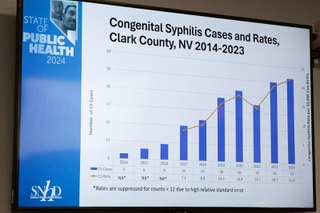
SNHD Health Officer Fermin Leguen makes a few remarks during the Southern Nevada Health District’s State of Public Health address Tuesday April 2, 2024.
Thursday, April 4, 2024 | 2 a.m.
Congenital syphilis was found in six babies stillborn and another 53 live births last year in Clark County, sounding an alarm with health officials because the disease is “completely preventable” and can be treated with antibiotics, said Tabby Edelman, senior disease investigation and intervention specialist at the Southern Nevada Health District.
Syphilis, which is transmitted through various forms of penetrative sex, has four stages that typically begins with a single or multiple sores around the area the infection entered the body, according to the Centers for Disease Control and Prevention. It becomes congenital syphilis when a pregnant woman passes it onto their baby, Edelman said.
“This is a condition that is fully preventable, but it is a condition that is affecting many families across the country and also our community,” said Dr. Fermin Leguen, district health officer at the Southern Nevada Health District during the agency’s State of the Health presentation Tuesday.
Nevada ranked eighth nationally for the number of congenital syphilis cases per 100,000 live births, said Angel Stachnik, a senior epidemiologist for the health district. As of 2022, the most recent year with data, Nevada had a rate of 193 cases of congenital syphilis per 100,000 live births — surpassed only by states such as Texas and neighboring Arizona.
All pregnant people are encouraged to receive syphilis testing at their first prenatal visit, but some may need testing again during their third trimester and at delivery, Edelman said.
The sexually transmitted infection can cause miscarriage, stillbirth, premature birth, a low birth weight or even the death of a baby shortly after birth, according to the CDC.
Those infants who survive could live with deformed bones, severe anemia, an enlarged liver or spleen, jaundice, brain and nerve problems, meningitis or skin rashes, they said.
Cases of congenital syphilis have more than tripled in recent years throughout the United States, the CDC added. More than 3,700 babies were born with syphilis in 2022 — over 10 times as many than in 2012 —the highest number reported in a single year since 1992.
Stachnik said the rates of infectious syphilis in both men and women have increased annually since 2014, but the number of cases for men has trended downward since 2021. The area of concern is infectious syphilis in women.
In 2014, the health district saw about six cases of infectious syphilis per 100,000 women, but as of 2022, recorded 28 cases per 100,000 women, according to Stachnik.
More women infected with the sexually transmitted infections can lead to more babies being born with congenital syphilis. The health district reported only three congenital syphilis cases during 2014, but in 2023, the agency recorded 53 cases, or 22 per 10,000 live births.
“Whenever we see an increase in females, we see congenital syphilis go up,” Stachnik said. “It is a huge increase that we have had within the past 10 years and so there’s lots to be done in terms of prevention.”
Carissa Orozco, a community health nurse with the health district, is part of the health district’s congenital syphilis case management program, which provides services to pregnant women who test positive for syphilis. Many of the women who sought the program’s services in 2022 had no previous prenatal care, and over 60% lacked insurance, Orozco said.
The Nevada Legislature in 2021 passed Assembly Bill 192 requiring medical professionals to perform a test for sexually transmitted infections on consenting pregnant patients and report the results — in addition to whether the person received treatment — to a local health system.
Orozco spends her days helping connect pregnant women with resources and reminding health care providers of AB 192 but said there were still challenges — including reaching out to unhoused expectant mothers.
The health district has drafted its next steps in combating the congenital syphilis crisis, Orozco said. It will expand its home administered treatment for syphilis (HATS) program to “provide straight medicine and meet clients where they are at, eliminating barriers such as a lack of transportation.”
A statewide Congenital Syphilis Review Board of state and local leaders in the health industry began meeting in September 2021 to identify cases of congenital syphilis, analyze opportunities for prevention, develop follow-up actions for intervention and institute solutions to prevent congenital syphilis.
Some of theissues identified include lack of health care access as well as awareness of sexually transmitted infections and a perceived low risk of them. Orozco proposed possible solutions that range from leveraging social media to spread awareness to age-appropriate sexual education in schools.
“Sexual health matters, (and) it’s important we have these conversations,” Orozco said. “I know they’re uncomfortable; patients are uncomfortable (and) providers are uncomfortable, but we need them to make sure our patients are safe, and our community is healthy."
[email protected] / 702-948-7854 / @gracedarocha

